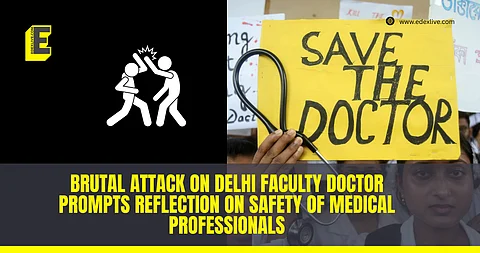

On the night of June 27, near Gate 12 of Delhi’s Guru Teg Bahadur (GTB) Hospital, Associate Professor Dr Kuldeep Kumar, a faculty member, was brutally assaulted while on a routine security round.
The attack was carried out by three men, one of whom claimed to be a Delhi Police Assistant Sub-Inspector (ASI), and it left him with a head injury as he was struck with a liquor bottle.
The violence, sudden and unprovoked, underscores what Dr Arun Kumar of United Doctors’ Front (UDF) Bharat describes as a deeply disturbing trend: “Doctors are being hunted on campuses.”
Despite the severity of the incident, the hospital administration has remained silent. The GTB Hospital administration has yet to issue an official statement or demonstrate visible outreach to faculty and residents.
According to ANI, Dr Kuldeep was conducting a regular round with his team when the assault took place.
“One of them claimed to be an ASI but refused to show any identification. Then they attacked me, hitting me on the head with a liquor bottle," he told ANI, referring to one of the three assailants, later identified as ASI Manoj.
GTB Hospital security reportedly did not intervene, and police arrived only after the attack had concluded.
Speaking exclusively to EdexLive, Dr Hanuman Bishnoi, a UDF member and casualty doctor at Dr Hedgewar Hospital, said he reached the spot shortly after the attack. “Two of the attackers had already been detained, but ASI Manoj, the man who allegedly struck Dr Kuldeep, was not present. We found his bike on the scene and used it to confirm his identity. We continued to press the police for action. They claimed the ASI was in custody, but when we went to the GTB police station, the officers were rude and evasive. There was no cooperation, not even during the FIR filing process.”
The problem extends far beyond Delhi's borders.
Recent incidents in Jodhpur and Udaipur have followed similar patterns, suggesting a nationwide crisis regarding hospital security.
Dr Arun Kumar, National General Secretary of UDF Bharat, who arrived at the scene after the assault, noted the disturbing frequency of such attacks.
“This isn’t the first time something like this has happened. Just last year, armed men entered GTB wards and shot people. Violence against doctors is becoming routine. That says something about how broken the system is,” he says.
He emphasised that the deeper issue lies in systemic failure. “Hospital security across the country has been outsourced to third-party agencies. These guards are underpaid and untrained. They’re not equipped or motivated to step in during violent situations. We used to have Central Industrial Security Force (CISF) security in institutions. Now it’s been handed over to the lowest bidder, and we’re all paying the price,” he adds.
The assault on Dr Kumar represents an escalation in the pattern of violence.
While previous incidents primarily targeted resident doctors, this attack involved a senior faculty member at the hospital's main entrance.
The symbolic significance was not lost on the medical community.
As Dr Bishnoi observed, “He's around 55 years. To be a faculty member and attacked on your own campus...where can doctors be safe? When a senior doctor is not safe inside the hospital, it sends a chilling message to everyone else.”
The involvement of a police officer in the assault has added a disturbing element to the case. Despite attempts by medical associations to contact senior police officials, including the Deputy Commissioner of Police (DCP), Assistant Commissioner of Police (ACP), and Sub-Inspector (SI), there has been no response.
According to reports, ASI Manoj has not been suspended or formally charged, despite eyewitness accounts of his alleged involvement.
“This is an unjustifiable reversal of roles.” said Dr Arun Kumar. “The police, who are supposed to protect the public, ended up assaulting someone who serves the public. It’s disturbing and dangerous.”
The incident highlights broader expectations and burdens within India's healthcare system. Public frustration with perceived delays manifests as violence against medical staff.
“There's a growing public frustration with the healthcare system. People walk into hospitals expecting instant, VIP level care,” Dr Arun Kumar explained. “What many don't understand is that we follow a triage system, but everyone wants to be treated as a top priority, regardless of medical severity.” And this sentiment often gives rise to aggression.
Medical professionals are now calling for systemic reforms that go beyond individual incidents.
UDF has demanded the formation of an independent oversight body comprising retired army officers, senior police officials and medical jurists to investigate the rising trend of violence against doctors.
The goal is not merely justice for Dr Kumar, but also the prevention of future attacks through clear accountability mechanisms and deterrent action.
The demands include immediate suspension of ASI Manoj and reassignment of hospital security to the CISF or an equally competent agency. “This is a matter of life and death, not just for doctors, but for patients as well," Dr Arun Kumar emphasised.
As Dr Kumar recovers from his physical injuries and emotional trauma, his case has become a rallying point for healthcare workers nationwide.
The question that hospital corridors across India remains: If senior doctors are not safe in their own institutions, who is?
Until this fundamental question is addressed through concrete action rather than administrative silence, the cycle of violence against medical professionals may persist, undermining the safety of public healthcare in India.
